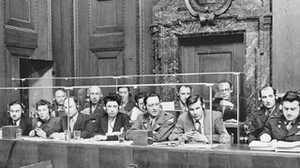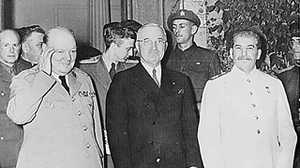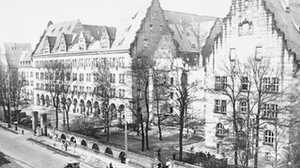Nazis on Trial in Nuremberg

After the Allies agreed to bring major Nazi leaders to trial, they had trouble deciding whom to indict. Top Nazi leaders Adolf Hitler, Heinrich Himmler, and Joseph Goebbels had committed suicide, leaving their less powerful colleagues to be held accountable. On October 18, 1945, the United States, Great Britain, France, and Russia issued an indictment against 24 men and six Nazi organizations. Twenty-two of the indicted men eventually sat in the dock in the Nuremberg courtroom. Three of the defendants escaped trial: industrialist Gustav Krupp, who was too frail; Hitler's private secretary Martin Bormann, whose remains were finally located in Berlin in 1972; and labor leader Robert Ley, who hanged himself before the trial.
The Chief Defendant
Hermann Göring, the trial's most important defendant, had been commander in chief of the Luftwaffe, president of the Reichstag, director of the Four Year Plan, and Hitler's acknowledged successor at the outbreak of the war. Following his surrender to Allied troops, he arrived in Austria with four aides, a nurse, two chauffeurs, a five-member kitchen crew, and his family, but left behind a train filled with stolen art and enough caviar and champagne for a lifetime. Upon his arrival in Nuremberg, he presented an autographed picture to an American general with the inscription: "War is like a football game, whoever loses gives his opponent his hand, and everything is forgotten." Göring couldn't have been more wrong. The tribunal found him guilty on all four counts and sentenced him to death by hanging. He would commit suicide before his scheduled execution.
On the Witness Stand
Before Göring's final reckoning, however, he would have one final moment in the spotlight, on the witness stand at Nuremberg. As he sat down, he broke out in a sweat. His hands trembled. But when he regained composure, he reveled in the spotlight and claimed a place beside Hitler as a powerful leader of the Nazi movement. Göring's testimony captured the world's attention. Life magazine called his two weeks of defense "arrogant, crafty and intelligent ... Göring obviously enjoyed himself as he kept the courtroom spellbound for days ... Göring was anxious, whatever his fate, that history record him as an important world figure and as a German hero."
Thirteen Sentenced to Death
The prosecution delivered evidence against the defendants in summary form, emphasizing instead the overall criminality of the Nazi regime. The defendants generally claimed ignorance of a larger plan and distanced themselves from the chain of command. Most admitted to the crimes of which they were accused, but claimed they were following orders. Defendants who were directly involved in killing received the death sentences: Bormann (in absentia); Hans Frank, leader of occupied Poland; Wilhelm Frick, minister of the interior; Göring; Alfred Jodl, Army chief; Ernst Kaltenbrunner, SS commander; Wilhelm Keitel, head of Armed Forces High Command; Erich Raeder, former commander of the Navy; Joachim von Ribbentrop, minister of foreign affairs; Alfred Rosenberg, protector of the Eastern Occupied Territories; Fritz Sauckel, plenipotentiary of the Nazi forced labor program; Arthur Seyss-Inquart, leader of occupied Holland; and Julius Streicher, the anti-Semitic newspaper editor.
Six Given Prison Terms; Three Acquitted
Nazis who played key roles in the Holocaust, including high-level government officials and business executives who used concentration camp inmates as forced laborers, received prison sentences or acquittal. Karl Dönitz, head of the Navy was sentenced to ten years; Walter Funk, minister of economics and Rudolf Hess, Hitler's deputy were sentenced to life in prison; Konstantin von Neurath, protector of Bohemia and Moravia got 15 years; Baldur von Schirach, head of the Hitler Youth and Albert Speer, architect of the Third Reich and minister of armaments, were both sentenced to 20 years. Radio commentator Hans Fritzsch, former German Chancellor Franz von Papen, and former Reichsbank President Hjalmar Schacht were acquitted.
Another Famous Trial
Long after the war, trials of Nazis continued to take place both in Germany and around the world. Nazi-hunters captured Adolf Eichmann, Gestapo head for Jewish affairs, in Argentina. Eichmann had been responsible for organizing the exterminations of millions of people. At his trial in Israel, hundreds of witnesses, many of them survivors, testified to his role in the Holocaust. Eichmann was found guilty and executed in 1962.







